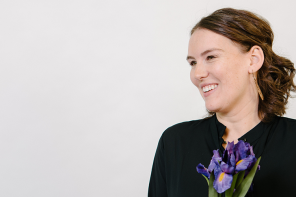By Emily Leas | Illustrated by Ann Christianson
Olivia Tompach, 15, settles onto the floor of her living room and opens a yellow cardboard box—her safety box. A smile spreads across her face as she squeezes a tiny rubber Koosh ball between her fingers. She says this is her favorite of all the items added to the box during her inpatient stay at UnityPoint Health–Meriter’s Child and Adolescent Psychiatry facility on Madison’s Southwest side. She spent six days there after a suicide attempt in February 2018.
“It felt like I was in this deep black hole,” says Olivia of the time leading up to that point.
Tina Noel, Olivia’s mom, says that her bubbly, athletic daughter stopped socializing, and even got to the point of not wanting to get out of bed.
Using her nurse practitioner background, Noel tried to treat Olivia’s depression like the medical condition that it is. She made sure her daughter ate well, slept well, exercised, socialized and built a relationship with a therapist. But the outpatient and at-home treatment wasn’t enough. After her suicide attempt, Olivia was on the waitlist for two days before being admitted to the inpatient facility.
“Those were sleepless nights. I would sit next to her bed with my hand on her chest, just making sure she was safe,” Noel recalls.
UnityPoint Health–Meriter’s Child and Adolescent Psychiatry facility is at the end of a winding road, wooded and peaceful. But inside, medical director Katie Schmitt admits that it’s clinical and crowded.
As the only inpatient psychiatric facility in Dane County for children and adolescents, the waitlist often extends to two months. From 2010 to 2018, the number of patients seen per year has steadily increased from around 300 to an expected 800 in 2018, driving the need for a $13 million expansion now underway.
“We’ve used bathrooms as offices, and sometimes we have to sit on the floor when talking to kids because there isn’t enough room,” Schmitt says. And the growing waitlist for kids with aggressive and reactive conditions doesn’t allow her to use the facility’s full capacity.
“We have eight rooms for the younger kids (6-12 years old), but if you try to put that many kids on top of each other with aggression in that small amount of space it does not work. So we spread them out and mix in older kids where it makes sense, but it still caps us for how many beds we can fill.”
Peggy Scanlon, medical director at Rogers Memorial Hospital in Oconomowoc, Wisconsin, notes that its facility also is expanding. The residential program for psychiatry allows for six- to 12-week stays and is expanding in 2019 from 182 rooms to 244. While Rogers Memorial sees patients of all ages, she says that anxiety, depression and suicidality are on the rise in kids and teens.
“It’s pretty clear that screen time and social media are contributing to the increased rate,” she says. “And it’s evident that the rise started in 2011 when more than 50 percent of kids started to have devices.”
The 2018 Dane County Youth Assessment reported that 20.7 percent of all 7th to 12th-grade youth reported they had suicidal thoughts during the past 30 days. That was up from 12.3 percent in 2012.
Scanlon explains that evidence-based therapies such as cognitive behavioral therapy and mindfulness provide resources for kids to cope with strong emotions and have proven more effective and long-lasting than just talk therapy.
“Mood follows behavior,” Scanlon says. “We know if we get them socializing face to face, active, out in the world, it’s a very effective treatment for depression and anxiety. We can’t allow kids to just retreat into the bubble of screen overuse and social media.”
The planned changes at UnityPoint Health–Meriter follow this same line of thinking with a dedicated yoga and meditation room, outdoor track, play equipment and gardens—changes that inspired Noel to jump in when asked to become co-chair for the expansion fundraising committee. She felt she couldn’t say no to such an important cause that had affected her family personally.
The money raised will create much needed changes to the layout of the facility. Schmitt’s face lights up as she traces her finger along the architectural rendering of the expansion, showing three new units separated by quiet rooms and alcoves.
“And there are outpatient spaces!” she says excitedly. “Part of what I’d love to do with the outpatient space in the evening is to have support groups for families and for the community, to have a place where people can come and learn.”
In addition to the outpatient programs, Schmitt explains they are creating levels of care to include an 8-hour daily program called partial hospitalization, and a 4-hour day treatment.
Her dream for the expansion is to have no wait list, she says with a smile.
Meanwhile they continue to serve a rising need. Olivia attests that her stay at the adolescent psychiatry facility gave her the skills to cope and resources to feel safe.
If your child or loved one needs help, the 24-hour crisis line is (608) 280-2600. To donate to the Unity Point–Meriter Child and Adolescent Psychiatry expansion, visit unitypoint.org.



